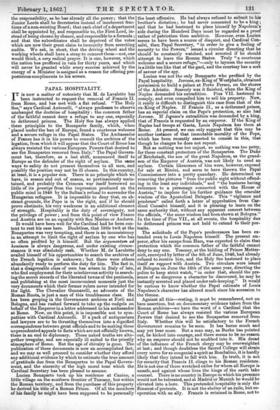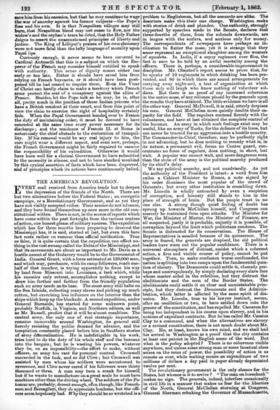PAPAL HOSPITALITY.
I T is now a matter of notoriety that M. de Lavalette has been instructed to request the removal of Francis II. from Rome, and has met with a flat refusal. "The Holy See," says Cardinal Antonelli, "always professes to observe unchanged the doctrine of hospitality : the common father of the faithful cannot deny a refuge to any one, especially to dethroned princes. The Holy See has always applied these principles to the Bonaparte family, which, when placed under the ban of Europe, found a courteous welcome and a secure refuge in the Papal States. The Ambassador of France has it in his power to consult the archives of the legation, from which it will appear that the Court of Rome has always resisted the various European Powers that desired to see the Bonapartes removed from Italy." The Papal Govern ment has, therefore, as a last shift, announced itself to Europe as the defender of the right of asylum. The same ways to safety do not present themselves to all men, and possibly the position may not be ill chosen. In this country, at least, it is a popular one. There is no principle which we have in season and out of season, so pertinaciously main tained, and probably the Crimean war itself borrowed no little of its prestige from the impression produced on the public mind in 1848 by the Sultan's refusal to surrender the Hungarian refugees. It is impossible to deny that, on abstract grounds, the Pope is in the right, and if he should prove obstinate, his very weakness is an additional element of strength. Hospitality is the duty of sovereignty, not the privilege of power ; and from this point of view France and Austria are on an equality with San Marino or Andorre. It would have been well for the Cardinal had he been content to rest his case here. Doubtless that little twit at the Bonapartes was very tempting, and there is an inconsistency in an attempt to limit the right of asylum by one who has so often profited by it himself. But the argumentum ad kominem is always dangerous, and under existing circumstances it was absolutely rash. Whether M. de Lavalette availed himself of his opportunities to search the archives of the French legation is unknown ; but there were others abundantly ready to perform the duty for him. The fact is, that a disagreeable class of men has arisen in Italy of late, who find employment for their mischievous activity in searching the secret records of the liberated towns of the peninsula, and publishing at the most inconvenient moments just the very documents which their former rulers never intended for the light. The Chevalier Gennarelli, an advocate of the Roman Ruota, is just a man of this troublesome class. He has been groping in the Government archives at Forli and Bologna, and has rushed forward to take up the cudgels on behalf of the Emperor in a letter addressed to his ambassador at Rome. Now, on this point, it is impossible not to sympathize with Cardinal Antonelli. If a pack of antiquarians and lawyers are to be thrusting themselves into a dignified correspondence between great officials and to be making these unprecedented appeals to facts which are not officially known, there is an end to diplomacy. These naked truths are altogether irregular, and are especially ill suited to the priestly atmosphere of Rome. But the age of chivalry is gone. The publication of these documents is now an accomplished fact, and we may as well proceed to consider whether they afford any additional evidence by which to estimate the true amount of gratitude due from the Bonapartes to the Papal Government, and the sincerity of the high moral tone which the Cardinal Secretary has been pleased to assume. Lucien Bonaparte took up his residence at Canino, a little village on the southern frontier of Tuscany, but within the Roman territory, and from the purchase of this property he derived his title of a Roman Prince. Of all the members of his family he might have been supposed to be personally the least offensive. He had always refused to submit to his brother's dictation ; he had never consented to be a king ; and that he had hastened to place himself by Napoleon's side during the Hundred Days must be regarded as a proof rather of patriotism than ambition. However, even Lucien seems to have been a source of disquiet, and Cardinal Consalvi, then Papal Secretary, "in order to give a feeling of security to the Powers," issued a circular directing that he should be constantly watched, and arrested if he should attempt to leave the Roman States. Truly "a courteous welcome and a secure refuge,"—only to laymen the security is a little too like that of the gaol, and the courtesy has a sort of savour of the spy. Lucien was not the only Bonaparte who profited by the Papal hospitality. Jerome, ex-King of Westphalia, obtained permission to build a palace at Porto Fenno, on the shores of the Adriatic. Scarcely was it finished, when the King of Naples demanded his extradition. Pius VII. hastened to comply, and even compelled him to sell his property. Now, it really is difficult to distinguish this case from that of the ex-King of Naples. If Francis II., as a dethroned prince, has an especial claim on the Pope's protection, so also had Jerome. If Jetfome's extradition was demanded by a king, that of Francis is requested by an emperor. If the King of Naples had troops at Gaeta, Louis Napoleon has them at Rome. At present, we can only suggest that this may be another instance of that immutable morality of the Pope, which has been recently asserted to consist in this, that though he changes he does not repent. But as nothing was too unjust, so nothing was too petty, for these constant protectors of the Bonapartes. The Duke of Reichstadt, the son of the great Napoleon, as the grandson of' the Emperor of Austria, was not likely to need an asylum. Certain likenesses of him were, however, exposed for sale at Rimini, and seem to have thrown the Papal Commissioner into a pretty quandary. He determined on removing the pictures "from the public sight without offending in the least any individuals," and "the business having reference to a personage connected with the House of Austria," to implore for his further guidance the oracular wisdom of the Apostolical Delegate. This "vigilance and prudence" called forth a letter of approbation from Cardinal Consalvi himself, and it is pleasing to learn on the same authority that, without any apparent concert between the officials, "the same wisdom had been shown at Bologna." In the time of Pius VII., at all events, the hospitality due to dethroned princes was not held to extend to their portraits.
The solicitude of the Pope's predecessors has been extended even to Louis Napoleon himself. The present em peror, after his escape from Ham, was expected to claim that protection which the common father of the faithful cannot deny to any one. Tuscany, at the bidding of Prince Metternich, conveyed by letter of the 8th of June, 1846, had already refused to receive him, and the Holy See hastened to place itself en rapport with Austria. Two circulars were issued at Bologna on June the 16th of the same year, directing the police to keep strict watch, "in order that, should the pre sence of so dangerous a character be discovered, he may be instantly arrested and placed under safe-keeping." It would be curious to know whether the Papal estimate of Louis Napoleon's character has altered much since his accession to the throne.
Against all this—resting, it must be remembered, not on bare assertion, but on documentary evidence taken from the Roman archives—we have the word of a Cardinal that the Court of Rome has always resisted the various European Powers that desired to see the Bonapartes removed from Italy. Whether this will be satisfactory to the French Government remains to be seen. It has borne much and may yet bear more. But a man may, as Burke has pointed out, be kicked into courage, and there seems to be no reason why an emperor should not be snubbed into it. His dread of the influence of the French clergy may be overweighted at last ; and though doubtless the Sacred College will strain every nerve for so congenial a spirit as Bombalino, it is hardly likely that they intend to fall with him. In truth, it is not for security that Francis II. clings to his Roman residence. He is not one of those wretched exiles for whom all Europe is unsafe, and against whose lives the kings of the earth take counsel. There is no country in Europe in which his presence would not be tolerated, and at Madrid or Munich be would be elevated into a hero. This pretended hospitality is only the flimsiest of pretexts. It is not the shelter of an exile, but cooperation with an ally. Francis is retained in Rome, not to save him from his enemies, but that he may continue to wage the war of anarchy against his former subjects—the Pope's foes and his own. It is that Neapolitan villages may still burn, that Neapolitan blood may not cease to flow, nor the -widow's and the orphan's tears he dried, that the Holy Father deigns to assert the unaccustomed principles of liberty and justice. The King of Lilliput's praises of his own clemency were not more fatal than the lofty language of morality upon Papal lips. Curiously enough, it never seems to have occurred to Cardinal Aiatonelli that this is a subject on which the Emperor of the Prench may consider himself entitled to speak with authority. This sense of dignity comes either too early or too late. Either it should have saved him from relying on French bayonets, or it should have been postponed till he had ceased to require them.. Even the Vicar of Christ can hardly claim to make a territory which Freneh arms protect the seat of a conspiracy against the allies of France. Besides, let the Pope talk as he may, he is, after all, pretty much in the position of those Indian princes who have a British resident at their court, and from this point of view the claim to exercise the right of hospitality certainly fails. When the Papal Government kande over to France the duty of maintaining order, it must be deemed to have conceded at the same time every power necessary for its discharge ; and the residence of Francis II. at Rome is notoriously the chief obstacle to the restoration of tranquillity. If his removal would be any real injury to him, the case might wear a different aspect, and even now, perhaps, the French Government might be fairly required to assume the responsibility of his extradition. Otherwise it would have been well for a clerical Government to have submitted to the necessity in silence, and not to have shocked mankind by this cynical assertion of facts which have been disproved, and of principles which its actions have continuously belied..































 Previous page
Previous page